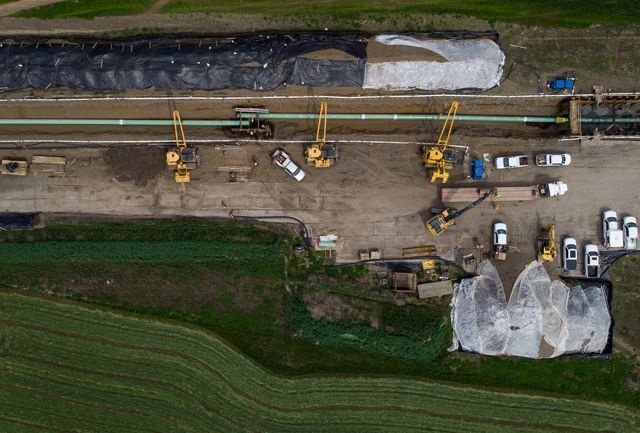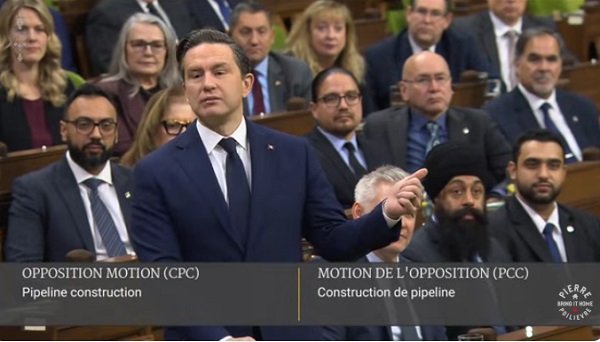Energy
First Nation wants reasons for Trans Mountain ruling; says it’s entitled to appeal

In this photograph taken with a drone, workers lay pipe during construction of the Trans Mountain pipeline expansion on farmland, in Abbotsford, B.C., on Wednesday, May 3, 2023. A B.C. First Nation is asking the Canada Energy Regulator to release its reasons as soon as possible for allowing a modification of the Trans Mountain pipeline’s route.THE CANADIAN PRESS/Darryl Dyck
By Amanda Stephenson in Calgary
A B.C. First Nation is asking the Canada Energy Regulator to release its reasons as soon as possible for allowing a modification of the Trans Mountain pipeline’s route.
In a letter to the regulator dated Wednesday, a lawyer representing the Stk’emlúpsemc te Secwépemc Nation (SSN) said the decision to grant the route deviation Monday without providing its reasons has left the First Nation without the ability to decide its next steps.
The letter said the First Nation has the right to request a reconsideration of the decision, or to appeal it through the Federal Court of Appeal.
“This has, in fact, created significant uncertainty for SSN and left SSN without the procedural options that would otherwise be afforded to it with the potential for irreparable harm to its rights and title as a result,” the letter states.
The Canada Energy Regulator ruled Monday to allow Trans Mountain Corp. to alter the route slightly for a 1.3-kilometre stretch of pipeline in the Jacko Lake area near Kamloops, B.C.
It said it would release its reasons for the decision in the coming weeks.
Trans Mountain Corp, a Crown corporation, had requested the change because of what it said were engineering difficulties in the area related to the construction of a tunnel.
The company had warned that being forced to stick to its original route and construction method could result in up to a nine-month delay in the pipeline’s completion, as well as an additional $86 million more in project costs.
Trans Mountain had been hoping to have the pipeline completed by early 2024.
But the Stk’emlúpsemc te Secwépemc Nation, whose traditional territory the pipeline crosses and who had only agreed to the originally proposed route, opposed Trans Mountain’s application.
The First Nation has said the new route threatens to disturb land that has spiritual and cultural significance.
The First Nation’s lawyer said in the letter Wednesday that Trans Mountain has indicated it wants to break ground on the new route on Oct. 2.
The Trans Mountain pipeline is Canada’s only pipeline system transporting oil from Alberta to the West Coast. The expansion, which is currently underway, will boost the pipeline’s capacity to 890,000 barrels per day (bpd) from 300,000 bpd.
The pipeline — which was bought by the federal government for $4.5 billion in 2018 after previous owner Kinder Morgan Canada Inc. threatened to scrap the expansion project in the face of environmentalist opposition and regulatory hurdles — has already been plagued by construction-related challenges and delays.
Its projected price tag has also soared: first to $12.6 billion, then to $21.4 billion and most recently to $30.9 billion.
This report by The Canadian Press was first published Sept. 28, 2023.
Automotive
The $50 Billion Question: EVs Never Delivered What Ottawa Promised

Beware of government promises that arrive gift-wrapped in moral certainty.
The pattern repeats across the sector: subsidies extracted, production scaled back, workers laid off, taxpayers absorbing losses while executives collect bonuses and move on, and politicians pretend that it never happened. CBC isn’t asking Justin Trudeau, Katherine McKenna or Steven Guilbeault any questions about it. They are not asking Mark Carney.
Buy an electric vehicle, they said, and you will save the planet, no questions asked. Justin Trudeau and several of his ministers proclaimed it from podiums. Environmental activists, often cabinet members, chanted it at rallies. Automotive executives leveraged it to extract giant subsidies. For over a decade, the message never wavered: until $50 billion in public money disappeared into corporate failures, and the economic wreckage became impossible to ignore.
Prime Minister Mark Carney, himself a spokesperson for the doomsday culture, inherited the policy disaster from Trudeau and still clings to the wreckage. The 2026 EV sales target sits suspended, a grudging acknowledgment that reality refused to cooperate with radical predictions and Ottawa’s mandates. Yet the 2030 and 2035 targets remain federal law, monuments to a central-planning exercise that delivered the opposite of what it promised.
Their claims were never quite true. Electric vehicles were pure good. They were marketed as unconditionally cleaner than conventional cars, a transformation so obviously beneficial that questioning it invited accusations of climate denial. Government messaging suggested switching to an EV meant immediate environmental virtue. The nuance, the conditions, and the caveats were conveniently omitted from the government sales pitch that justified tens of billions of your money into subsidies for foreign EV manufacturing and corporate advancement.
The Reality Ottawa Is Hiding
Research documented the conditional nature of EV benefits for over a decade, yet Ottawa proceeded as if the complexity didn’t exist. Studies from China, where coal dominates electricity generation, showed as early as 2010 that EVs in coal-dependent regions had “very limited benefits” in reducing emissions compared to gasoline vehicles. In Northern China, where electricity generation is over 80% coal-based, EVs could produce lifecycle emissions comparable to or even higher than those of conventional cars. A 2015 Chinese study found that EVs generated lifecycle emissions that were only 18% lower than those of gasoline vehicles, compared to 40-70% reductions in regions with cleaner grids.
Volvo began publishing transparent lifecycle assessments for its first EV in 2019, making it the first major automaker to document the significant upfront emissions from battery production publicly. Their 2021 C40 Recharge report, released during the COP26 climate summit in Glasgow, revealed that manufacturing an EV produces 70% more emissions than building a comparable conventional vehicle. But there are no CBC reports about that. The Volvo report showed that an EV charged on a coal-heavy global grid required 68,000 to 110,000 miles of driving to break even with a conventional car, potentially more than half the vehicle’s usable lifetime. For drivers with low annual mileage in regions with dirty electricity grids, that breakeven point could take six to nine years to reach, if ever.
Battery manufacturing location proved enormously consequential. Production in China, powered by coal, generates 60-85% higher emissions than manufacturing in Europe or the United States. Yet Canadian subsidies flowed to companies regardless of where batteries were made or where vehicles would be charged. The federal government committed over $50 billion without requiring the environmental due diligence that should precede such massive public investment.
The Canadian government never acknowledged Volvo’s findings. Not once. A search of federal policy documents, ministerial statements, and environmental assessments from 2019 forward reveals no mention of the lifecycle complexities Volvo documented. Ottawa’s silence on inconvenient research speaks loudly about how ideology trumped evidence in shaping EV policy.
You want to build a pipeline in Canada. There will be 8 to 10 years of red tape and environmental impact assessments. But if you say you want to make EVs, Laurentian provincial premiers and the feds will bend over backwards. They handed over billions while the economy and social conditions in their cities decayed.
The environmental promise was conditional: clean electricity grids, high annual mileage, manufacturing in regions with low-carbon energy, and vehicles driven long enough to offset the massive carbon debt from battery production. Remove those conditions, and the environmental case collapses. The subsidies, however, remained unconditional.
The Subsidies Flow, The Companies Fail
Corporate casualties now litter the landscape. Northvolt received $240 million in federal subsidies to build a Quebec battery plant before filing for bankruptcy protection in November. Lion Electric, Quebec’s homegrown EV manufacturer, burned through $100 million in government support before announcing massive layoffs and production cuts. Arrival, which secured subsidies for its electric van facility, collapsed entirely, leaving taxpayers with nothing but broken promises.
Stellantis and LG Energy Solution extracted $15 billion, the most extensive corporate handout in Canadian history, for their Windsor battery plant. Volkswagen secured $13 billion for St. Thomas. Provincial governments layered on additional incentives. The public investment dwarfed any plausible return, yet the money kept flowing based on environmental claims the government either never bothered to verify or suppressed from its own documents and reports.
Despite this flood of subsidies and regulatory coercion, Canadian consumers rejected the offering. Even with massive incentives, EVs accounted for only 15% of new vehicle sales in 2024, far short of the mandated 20% target for 2026, let alone the 60% demanded by 2030. When federal subsidies ended in early 2025, sales collapsed to 9%, revealing the limited consumer demand. Dealer lots overflow with unsold inventory. Manufacturers scaled back production plans. The market spoke; Ottawa is only half listening.
The GM plant in Oshawa serves as a cautionary tale. Thousands of jobs lost. Promises of green manufacturing jobs evaporated. Workers who believed government assurances that EV mandates would secure their livelihoods found themselves unemployed as companies redirected production or collapsed entirely. The pattern repeats across the sector: subsidies extracted, production scaled back, workers laid off, taxpayers absorbing losses while executives collect bonuses and move on, and politicians pretend that it never happened. CBC isn’t asking Justin Trudeau, Katherine McKenna or Steven Guilbeault any questions about it. They are not asking Mark Carney.
The Central Planning Failure
The EV disaster illustrates why economies run by political offices never succeed. Friedrich Hayek observed that “The curious task of economics is to demonstrate to men how little they really know about what they imagine they can design.” Politicians and bureaucrats in Ottawa do not possibly possess the dispersed knowledge embedded in millions of individual economic decisions. But they think that they do.
Markets aggregate information that no central planner can access. Consumer preferences for vehicle range, charging convenience, and total cost of ownership. Regional variations in electricity generation and the pace of grid decarbonization. Battery technology improvements and supply chain vulnerabilities. Resource constraints and mining capacity. These factors interact in ways too complex for any cabinet planning committee to comprehend, yet Ottawa presumed to mandate outcomes a generation in advance.
Federal ministers with no experience in automotive manufacturing or battery chemistry presumed to direct the transformation of a trillion-dollar industry. Career bureaucrats drafted regulations determining which vehicles Canadians could purchase years hence, as if they possessed prophetic knowledge of technological development, grid decarbonization rates, consumer preferences, and global supply chains.
The EV mandate attempted to force a technological transition. It was an economic coup. Environmental claims proved conditional at best. Billions in subsidies flowed to failing companies. Taxpayers absorbed losses while corporations extracted rents and walked away. It worked well for the corporations, but the coup failed Canadians and Canadian workers. They are not building back better.
Green ideology provided perfect cover for this overreach. Invoke climate emergency, and fiscal responsibility vanishes. Question subsidies and you’re labelled a denier. Point out that environmental benefits depend on specific conditions, and you’re accused of spreading misinformation. The rhetorical shield, aided and abetted by a complicit media unable to see past its own financial interests, allowed government to bypass scrutiny that should attend any massive industrial policy intervention.
The Trust Deficit
As Canadians learn that EV environmental benefits depend heavily on electricity sources and driving patterns, as they watch subsidized companies collapse, as they discover how thoroughly the promise was oversold and how completely Ottawa ignored contrary evidence, trust in government erodes. This badly needed skepticism will spread beyond EVs and undermine legitimate government functions.
It would be good if future government claims about environmental policy face rising skepticism. Corporations wrapping themselves in green rhetoric may be viewed as con artists. Environmental activists who championed these policies may see their credibility destroyed. When citizens conclude their government systematically misled them about costs, benefits, and basic facts while suppressing inconvenient research, liberal democracy itself suffers. But that may not happen at all in Laurentian LaLa-land or in the Pacific Lotusland.
Over fifty billion dollars are distributed among local and foreign industrialists, while tens of thousands live in tents in Laurentian cities.
The EV debacle demonstrates that overselling policy benefits, suppressing complexity, and using ideology to short-circuit debate produce a backlash far worse than honest acknowledgment of nuance would have. The damage compounds when governments commit billions based on conditional environmental claims they never verified, then remain silent when industry-leading manufacturers publish data revealing those conditions.
The Path Forward
Canada needs a full repeal of the EV mandate and a complete retreat from Ottawa directing market decisions. The EV law must be struck, not merely paused. The 2030 and 2035 targets must be abandoned entirely. No new subsidies for EV production (or any other production). No bailouts for failed battery plants. No additional funds for charging infrastructure. And absolutely no subsidies for conventional or hybrid vehicle production justified by the same environmental complexity that should have prevented EV mandates in the first place.
Let markets determine which technologies Canadians choose. If EVs deliver genuine value for specific consumers in specific circumstances—those with clean electricity grids, high annual mileage, and long vehicle ownership timelines—those consumers will buy them without mandates or subsidies. If hybrids or improved conventional vehicles better serve other consumers’ needs, manufacturers will produce them without government direction.
The aggregated wisdom of millions of economic actors making decisions based on their actual circumstances will produce better outcomes than any planning committee in Ottawa. Some Canadians will find EVs deliver environmental and financial benefits. Others will not. Both conclusions can be correct simultaneously, a nuance Ottawa spent $50 billion refusing to acknowledge.
Markets work because no one has to know everything. Central planning fails because someone must. I wish I could say that Ottawa has learned this lesson the expensive way. Or whether Laurentians will remember it at the next election. Or whether the same politicians and bureaucrats who delivered this disaster will identify the next technology to mandate and subsidize, armed with new promises that reality will eventually expose as conditional at best.
But let’s keep our dreams in check. It seems more likely, given their ideological make-up and propensities for certainty, that low-information Laurentian and Pacific Coast voters will go right for the next green-washed fantasy that the feds and provincial governments will put in front of them, provided it is coiled into a catchy slogan.
Subscribe to Haultain Research.
For the full experience, and to help us bring you more quality research and commentary,
please upgrade your subscription.
Business
Looks like the Liberals don’t support their own Pipeline MOU

From Pierre Poilievre
-

 Business2 days ago
Business2 days agoCanada invests $34 million in Chinese drones now considered to be ‘high security risks’
-

 Business2 days ago
Business2 days agoThe EU Insists Its X Fine Isn’t About Censorship. Here’s Why It Is.
-

 Great Reset2 days ago
Great Reset2 days agoSurgery Denied. Death Approved.
-

 Business2 days ago
Business2 days agoThe Climate-Risk Industrial Complex and the Manufactured Insurance Crisis
-

 Health2 days ago
Health2 days agoThe Data That Doesn’t Exist
-

 Crime1 day ago
Crime1 day agoInside the Fortified Sinaloa-Linked Compound Canada Still Can’t Seize After 12 Years of Legal War
-

 Economy2 days ago
Economy2 days agoAffordable housing out of reach everywhere in Canada
-

 National1 day ago
National1 day agoLiberal bill “targets Christians” by removing religious exemption in hate-speech law











